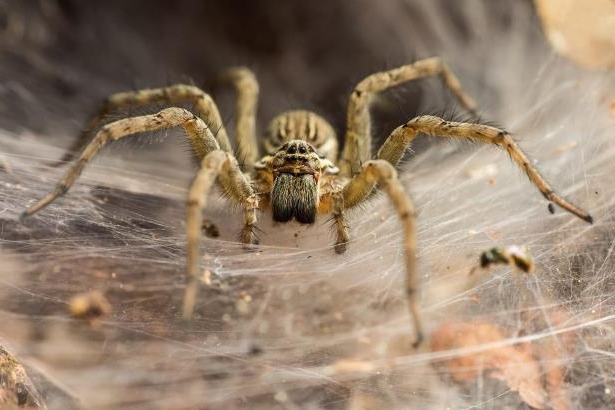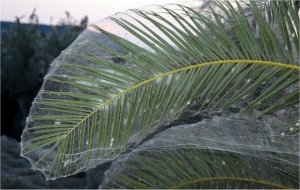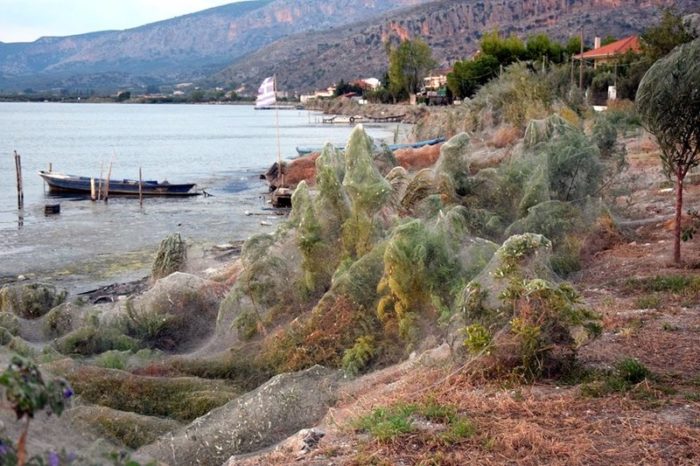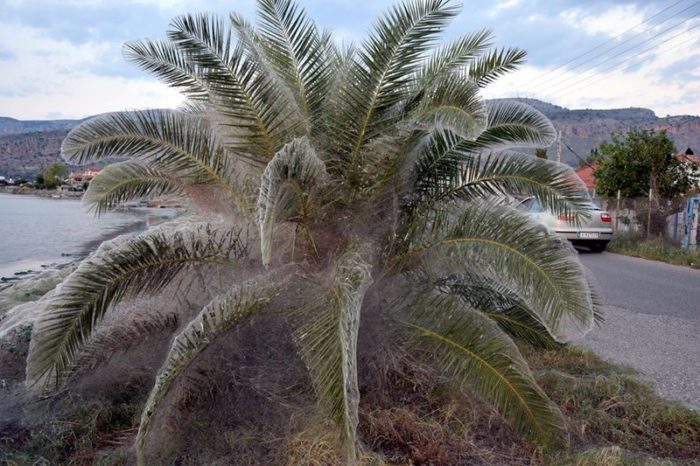It looks like you're using an Ad Blocker.
Please white-list or disable AboveTopSecret.com in your ad-blocking tool.
Thank you.
Some features of ATS will be disabled while you continue to use an ad-blocker.
12
share:
Halloween is still more than a month away, but yesterday I noticed several Seattle houses already decorated with fake cobwebs and tombstones (one
house in my neighborhood displays a "life-size" crashed flying saucer on the front lawn every year).
Aitoliko, a village in Greece, doesn't need fake decorations, because an entire beach has been covered with eerie looking spider webs! They remind me a bit of caterpillar infestations, but these webs are oddly attractive to me whereas the caterpillar webs slightly disgust my senses. What do you think? Gross or beautiful?
NEWSWEEK SOURCE ARTICLE





Aitoliko, a village in Greece, doesn't need fake decorations, because an entire beach has been covered with eerie looking spider webs! They remind me a bit of caterpillar infestations, but these webs are oddly attractive to me whereas the caterpillar webs slightly disgust my senses. What do you think? Gross or beautiful?
NEWSWEEK SOURCE ARTICLE

Warm temperatures and an abundance of food prompted an explosion in the spider population of a Greek seaside town—and their cobwebs have now blanketed a 300-meter expanse of the shoreline. Video footage shot in the western town of Aitoliko shows the webs covering everything from street signs to grass and palm trees in a veil of silk, with what appears to be hundreds of spiders lurking underneath. According to Greek news website the DailyHellas.com, the webs stretched for 300m. A genus of spider known as the Tetragnatha wove the webs, Maria Chatzaki, professor of molecular biology and genetics at Democritus University of Thrace, Greece, told Newsit.gr.
Warm temperatures, perfect humidity levels for the creepy crawlies and a spike in mosquitos—which they feast on— caused the boom in the population of Tetragnatha in the seaside town, she said. The spiders themselves are relatively small, but are capable of creating large swaths of silk under which to mate. The phenomenon usually happens towards the end of summer or in the early autumn when conditions are perfect. This occurs once every three to five years.




edit on 9202018 by seattlerat because: removed all caps from title
edit on 9202018 by seattlerat
because: (no reason given)
NOPE NOPE NOPE NOPE NOPE
NOPE
even though the spiders that wove them are small, I would still run away in terror
NOPE
even though the spiders that wove them are small, I would still run away in terror
In Greek mythology Arachne was a craftsman that challenged Athena and was turned into a spider .
There’s that .
There’s that .
edit on 20-9-2018 by Fallingdown because: (no reason given)
This is far from an isolated phenomenon. In May 2015, spiders rained from the sky in the town of Goulburn and similarly covered an expanse of greenery with cotton candy-like webs
GD eight legged freaks.
That would freak me out!
To me, if you can see it, it's huge. LOL


To me, if you can see it, it's huge. LOL


Spiders that completely cover towns with webs is no pet for a kid. Get them a dog, they'll be happier for it.
Awwww cute
So they made their webs and claimed their space for a while, then they'll disappear for another 5 years or so.
Don't be mean... they have to live somewhere too!
Harmless little critters!
So they made their webs and claimed their space for a while, then they'll disappear for another 5 years or so.
Don't be mean... they have to live somewhere too!
Harmless little critters!
a reply to: seattlerat
Thank the Gods they are harmless
wiki
Thank the Gods they are harmless
wiki
There are no known adverse effects of Tetragnatha versicolor on humans. The species is venomous, but its bite is not known to be harmful to humans.
I have seen similar giant webs in coastal Texas swampy areas.
I'd rather have millions of spiders than millions of mosquitoes.
I'd rather have millions of spiders than millions of mosquitoes.
Let 'em take care of the mosquito and other insect problems. Then have some silk(if usable enough) left over to use.
new topics
-
A Bunch of Maybe Drones Just Flew Across Hillsborough County
Aircraft Projects: 43 minutes ago -
Who's coming with me?
General Conspiracies: 1 hours ago -
FBI Director CHRISTOPHER WRAY Will Resign Before President Trump Takes Office on 1.20.2025.
US Political Madness: 5 hours ago -
The NIH is still sending taxpayer money to Chinese Labs to Conduct cruel animal experiments
Mainstream News: 5 hours ago -
Angela Merkel is terrified of dogs
Politicians & People: 7 hours ago
top topics
-
The NIH is still sending taxpayer money to Chinese Labs to Conduct cruel animal experiments
Mainstream News: 5 hours ago, 11 flags -
FBI Director CHRISTOPHER WRAY Will Resign Before President Trump Takes Office on 1.20.2025.
US Political Madness: 5 hours ago, 8 flags -
Should be BANNED!
General Chit Chat: 15 hours ago, 6 flags -
Will all hell break out? Jersey drones - blue beam
Aliens and UFOs: 13 hours ago, 5 flags -
A Bunch of Maybe Drones Just Flew Across Hillsborough County
Aircraft Projects: 43 minutes ago, 3 flags -
Angela Merkel is terrified of dogs
Politicians & People: 7 hours ago, 2 flags -
Who's coming with me?
General Conspiracies: 1 hours ago, 2 flags
active topics
-
And Here Come the Excuses!!
General Conspiracies • 147 • : cherokeetroy -
A Bunch of Maybe Drones Just Flew Across Hillsborough County
Aircraft Projects • 5 • : WeMustCare -
Who's coming with me?
General Conspiracies • 15 • : worldstarcountry -
The Final Experiment is Scheduled for December 2024. Will it Finally Answer the Question?
Science & Technology • 41 • : Arbitrageur -
Drones everywhere in New Jersey
Aliens and UFOs • 57 • : 38181 -
ILLUMINATION – Reverse Perception Of Cyclic Probability – CEO ASSASSINATION
Secret Societies • 22 • : Compendium -
Drones over New Jersey
Aliens and UFOs • 42 • : DontTreadOnMe -
UnitedHealthcare CEO Brian Thompson shot dead in Midtown Manhattan, masked gunman at large
Other Current Events • 169 • : Flyingclaydisk -
Will all hell break out? Jersey drones - blue beam
Aliens and UFOs • 38 • : BeyondKnowledge3 -
-@TH3WH17ERABB17- -Q- ---TIME TO SHOW THE WORLD--- -Part- --44--
Dissecting Disinformation • 3616 • : Thoughtful3
12

